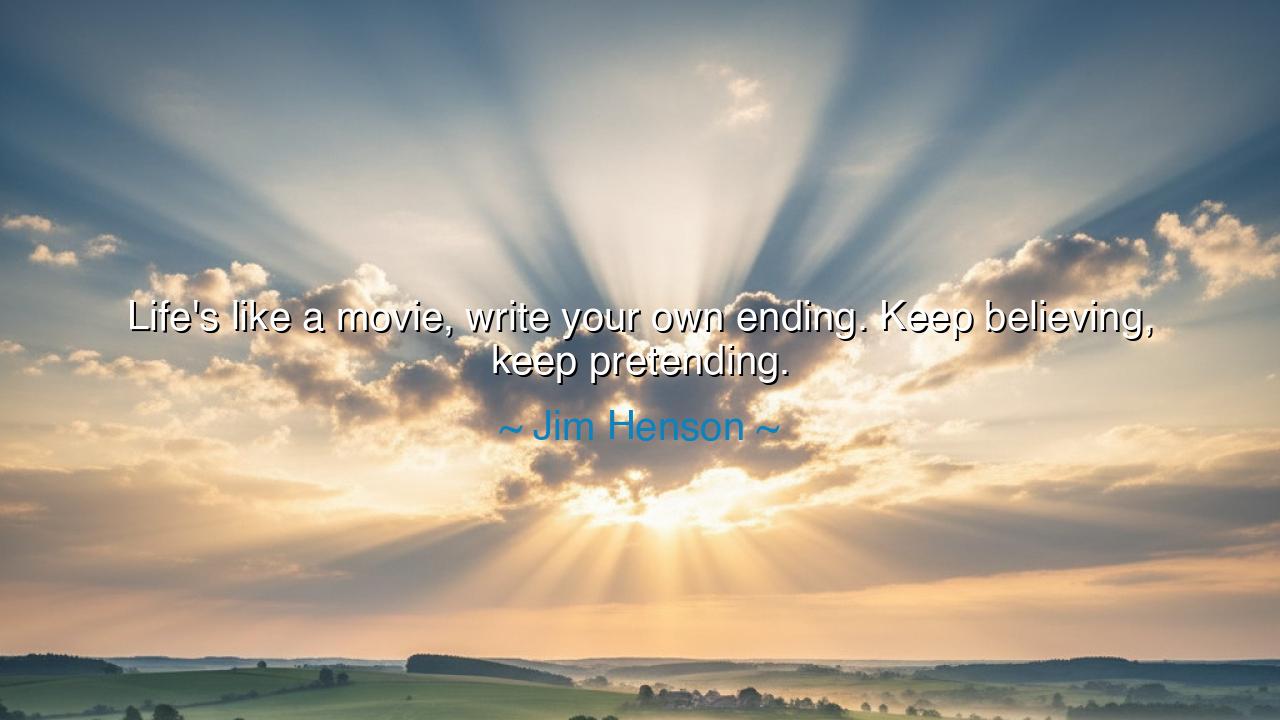
Life's like a movie, write your own ending. Keep believing, keep






Hear, O dreamers and builders of worlds, the words of Jim Henson, creator of visions and father of imagination: “Life’s like a movie, write your own ending. Keep believing, keep pretending.” In these few words, he opens to us a profound truth—that life is not a script already written, but a story yet unfolding. Each of us is both actor and author, both character and creator. The ending is not imposed by fate alone but shaped by the courage of our choices, the persistence of our belief, and the wonder of our imagination.
To say that life is like a movie is to remind us that our days are scenes strung together, each moment vivid, fleeting, and meaningful. There is comedy, there is tragedy, there is love, and there is loss. Yet unlike an audience, we are not passive watchers of the screen. We hold the pen. We direct the plot. We may be cast into circumstances not of our choosing, but the way we live within them, the ending we strive toward—these remain in our power.
Henson’s call to write your own ending is heroic in spirit. Too often, people live as though they were extras in another’s story, carried along by the currents of expectation or fear. Yet he urges us to step forward and claim authorship: to shape destiny with vision, to leave behind a legacy that reflects who we are, not who the world told us to be. This is not arrogance, but responsibility—the duty to live fully and to ensure that when the curtain falls, the story told of our lives is one of courage, joy, and meaning.
And what of his words: “Keep believing, keep pretending”? Here lies the heart of imagination, the essence of childhood that Henson never abandoned. To believe is to keep faith even when the world grows dark, to hold to dreams though they seem impossible. To pretend is not to deceive, but to create: to imagine new worlds, to play with possibility, to step into the roles we wish to embody until they become real. For every great achievement began first as a dream, as a “pretending” in the mind of one who dared to imagine.
History shows this power. Consider Thomas Edison, who refused to give up though thousands of experiments failed. He kept believing in light where only darkness reigned, and kept pretending that a world lit by human hands was possible. Or think of Martin Luther King Jr., whose “dream” was once dismissed as fantasy, mere pretending. Yet through belief, through persistence, through imagination, that dream reshaped a nation. These men, like Henson, understood that pretending is the seed of creation, and belief is the soil that nourishes it.
Henson himself embodied his own wisdom. With cloth, strings, and simple voices, he breathed life into puppets. To many, they were only fabric and foam, but to children—and to the child in every adult—they became beloved friends, teachers, and storytellers. This was his magic: he kept believing in imagination, kept pretending until the world believed with him. And through it, he taught that joy, kindness, and wonder are as real as anything else in life.
The lesson is clear: live your life as the story it is meant to be. Do not hand your pen to others; write your own ending with courage. Keep believing in your dreams, even when the world calls them foolish. Keep pretending, for imagination is the seed of every new creation. Act as if you are the hero of your story—because you are.
So I say to you, children of tomorrow: let your life be art. Write boldly. Dream without fear. Play, imagine, and believe until the very end. For life is like a movie, and though the curtain must fall, you alone can decide what final scene remains. Make it a tale of hope, of joy, of wonder. And let others, when they remember you, say: “Here was one who believed. Here was one who dared to pretend. And in so doing, they created a story worth living.”






AAdministratorAdministrator
Welcome, honored guests. Please leave a comment, we will respond soon